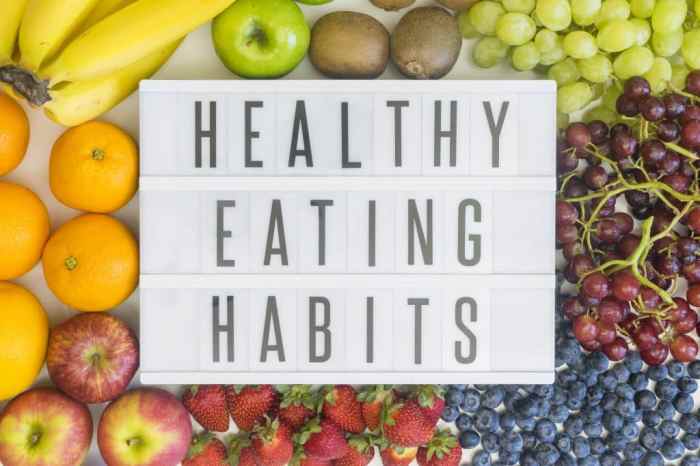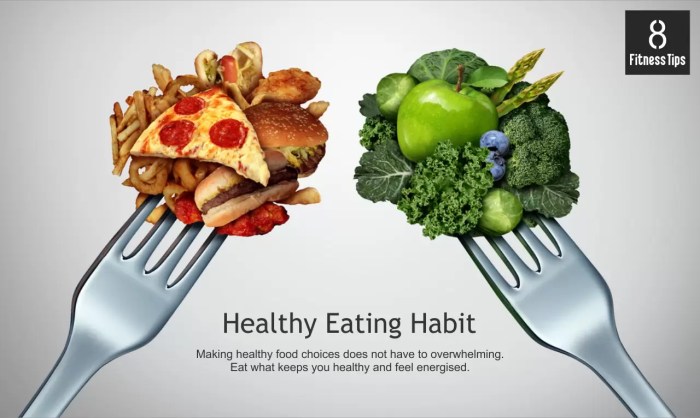Healthy Eating Habits at the forefront, this paragraph opens a window to an amazing start and intrigue, inviting readers to embark on a storytelling american high school hip style filled with unexpected twists and insights.
When it comes to maintaining a healthy lifestyle, nothing beats the power of Healthy Eating Habits. From boosting overall well-being to managing weight effectively, these habits play a crucial role in our daily lives. Let’s dive into the world of nutritious choices and smart eating strategies that can transform your health game for the better.
Benefits of Healthy Eating Habits

Maintaining a balanced diet is crucial for overall health and well-being. Healthy eating habits play a significant role in ensuring that our bodies receive the necessary nutrients to function properly. Good nutrition has a direct impact on physical health, helping to prevent chronic diseases and promoting a strong immune system.
Essential Nutrients for a Healthy Diet
- Protein: Essential for building and repairing tissues, as well as supporting immune function. Good sources include lean meats, poultry, fish, beans, and nuts.
- Fruits and Vegetables: Rich in vitamins, minerals, and antioxidants that help protect the body from diseases. Aim for a variety of colors to ensure a diverse nutrient intake.
- Whole Grains: Provide fiber for digestive health and energy. Opt for whole grain products like brown rice, whole wheat bread, and oatmeal.
- Healthy Fats: Omega-3 fatty acids found in fish, nuts, and seeds are important for brain function and heart health.
- Dairy or Dairy Alternatives: Good sources of calcium and vitamin D for strong bones and teeth. Choose low-fat options to reduce saturated fat intake.
Building Healthy Eating Habits

Eating more fruits and vegetables, meal planning, reading food labels, and reducing sugar intake are all essential strategies for building healthy eating habits.
Incorporating More Fruits and Vegetables
Eating a variety of fruits and vegetables is crucial for a well-rounded diet. Try incorporating them into every meal and snack. For example, add berries to your morning yogurt, have a side salad with lunch, and include steamed veggies with dinner.
Significance of Meal Planning
Meal planning helps you make healthier choices by preparing nutritious meals in advance. Set aside time each week to plan your meals, create a grocery list, and prep ingredients. This way, you’ll be less tempted to grab unhealthy fast food on busy days.
Reading Food Labels, Healthy Eating Habits
Understanding food labels is key to making informed choices. Look for the serving size, calories, and ingredients list. Pay attention to the amount of sugar, sodium, and unhealthy fats in the product. Choose items with fewer additives and processed ingredients.
Reducing Sugar and Processed Food Consumption
Limiting sugar and processed food intake can have a positive impact on your overall health. Opt for whole foods like fruits, vegetables, lean proteins, and whole grains instead. Swap sugary snacks for nuts, seeds, or plain yogurt with fruit for a healthier alternative.
Role of Healthy Eating in Weight Management
Eating healthy plays a crucial role in managing weight effectively. By making mindful choices and practicing portion control, individuals can achieve and maintain a healthy weight.
Portion Control and Weight Management
- Avoid oversized portions to prevent consuming excess calories, leading to weight gain.
- Use smaller plates and bowls to help control portion sizes and prevent overeating.
- Be mindful of portion sizes when eating out or ordering takeout to avoid consuming more than necessary.
Healthy Snacks for Weight Management
- Snack on fruits like apples, berries, or oranges for a low-calorie, nutrient-dense option.
- Choose nuts, such as almonds or walnuts, for a satisfying snack that provides healthy fats and protein.
- Opt for Greek yogurt or hummus with veggies for a balanced snack that keeps you full and satisfied.
Mindful Eating Practices
- Practice eating slowly and savoring each bite to help recognize hunger cues and prevent overeating.
- Avoid distractions like phones or TV while eating to focus on the meal and prevent mindless snacking.
- Pay attention to feelings of fullness and stop eating when satisfied, rather than finishing everything on the plate.
Impact of Healthy Eating on Mental Health
Eating a balanced diet can have a positive impact on mental well-being by providing essential nutrients that support brain function and mood regulation. The connection between gut health and mental health is increasingly recognized, as the gut microbiome plays a crucial role in producing neurotransmitters that affect mood and cognition.
Importance of Gut Health for Mental Well-being
Maintaining a healthy gut is essential for overall mental health, as the gut-brain axis allows communication between the gut and the brain. Consuming probiotic-rich foods like yogurt, kefir, and kimchi can help support a healthy gut microbiome, which in turn can improve mood and reduce symptoms of anxiety and depression.
Foods to Boost Mood and Reduce Anxiety
Including foods rich in omega-3 fatty acids such as salmon, walnuts, and chia seeds in your diet can help reduce inflammation in the brain and improve mood. Dark leafy greens like spinach and kale are also beneficial, as they contain folate, which plays a role in the production of serotonin, a neurotransmitter that regulates mood.
Role of Hydration in Supporting Brain Function
Staying hydrated is crucial for maintaining optimal brain function, as dehydration can lead to cognitive impairment and mood changes. Drinking an adequate amount of water throughout the day can help improve concentration, memory, and overall mental well-being.

